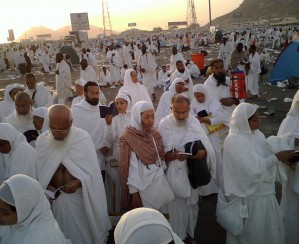 MINA: With the continuous noise, floodlights which made night look like day and due to numerous movements between the holy sites, pilgrims hardly had enough time to sleep. The luckiest of them may have had a maximum of three hours of un-interrupted sleep.
MINA: With the continuous noise, floodlights which made night look like day and due to numerous movements between the holy sites, pilgrims hardly had enough time to sleep. The luckiest of them may have had a maximum of three hours of un-interrupted sleep.
During Haj, people do not usually think much about sleep though it is a basic biological need. They give most of their time to activities that ensure them reward from Allah, including prayer, recitation of the Qur’an, supplication and others.
Doctors, however, do not see anything wrong in pilgrims not having sufficient hours of sleep.
“This is not a kind of sickness that needs cure but a natural phenomenon which will go away when the pilgrim goes back to his/her normal life,” a doctor said.
He said about 80 percent of the pilgrims would sleep normally once the Haj season is over and those who suffer lack of sleep after Haj should not be worried. “Everything will be all right after some time,” he added.
Mansour Al-Badri, a Saudi pilgrim, came to the health center in Mina and complained that he did not get enough sleep for more than a week.
“Since I arrived in Makkah about a week ago and I could not sleep properly,” he told the doctor. He said he was not used to sleeping outside his home and that the unabated noise and continuous movement were not helping.
He feared that he might lose his physical fitness to complete the rituals of Haj because of lack of sleep.
The doctor assured him not to worry and not to get used to taking sleeping pills because he would go back to normal once the Haj was over.
